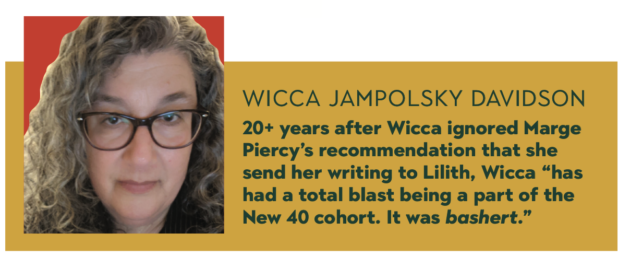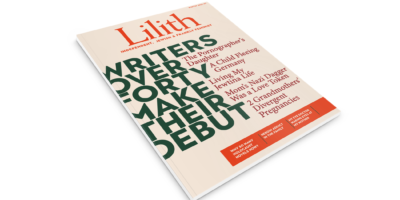
Dagger: A Love Token
 WHEN MY MOTHER DIED, I inherited a third of her small estate, some lovely china and silver, a Morris Louis painting and a World War II Nazi Sturm Abteilung dagger and scabbard.
WHEN MY MOTHER DIED, I inherited a third of her small estate, some lovely china and silver, a Morris Louis painting and a World War II Nazi Sturm Abteilung dagger and scabbard.
“Alles Fur Deutschland” was engraved on the blade. The brown wooden handle was slightly chipped. The swastika was sheared off, although the eagle it sat upon was still in place. The Sturm Abteilung mark was intact, as was the blade number and the name of the weapon maker—Karl Eichorn—with his cute little squirrel ram- part logo.
The dagger was a nasty 16-inch-long piece of cutlery that I wished was not in my desk drawer.
Before it was in my desk drawer, the dagger lived in my mother’s dresser drawer with her turtleneck shirts. Before that, it was unhitched from the belt of the dead body of a German SA officer. The young German Storm Trooper was killed by an American soldier. The American soldier was my mother’s hometown high school beau. I cannot remember his proper first name, but his nickname was Country and his last name was Page.
Country was important to my mother, although they had nothing in common. She loved him.
Country was a homegrown boy from Sampson County, North Carolina. My mother was a nice Jewish girl raised to go to college and marry a nice Jewish boy. My mother’s immigrant Polish parents moved to Clinton, North Carolina to open a dry goods store—one of the many “Jew Stores” scattered about the South. Instead of going to college, Country joined the Army. Country was not an officer. He fought during wwII and lived to come home.
While Country was fighting in Germany, my mother was in college at the University of North Carolina. The year she entered UNC-Chapel Hill was the first year that women were allowed to enroll in pharmacy school. The men who typically enrolled, for the most part were in uniform and fighting in Europe and the South Pacific.
When Country came back to Clinton in 1945, he brought the dagger to my mother. Country killed Nazis for my mother, and for the Allies. But my mother wouldn’t marry him, certainly in part because Country wasn’t Jewish, and possibly in part because he was an alcoholic. But until his death, and long after I was old enough to be living away from home, my mother spent at least a week every year with him. It was the norm. We never even thought about it.
After Country died, my mother would go spend time with his mother. And, yes, my mother was married—to my father, who was Jewish and who did (finally) finish college and with whom she had quite a bit in common, on paper.
Now I understood why my mother kept the dagger. It was a love token.
Since her death I had been trying to decide what to do with the thing. Was it valuable? Did I want to sell it? And if I sold the dagger—who would want it? Did I want to sell a Nazi dagger to the sort of person who would want to buy it? Not really.
Neo-Nazis, weapons collectors—they were not in my world. Or to be more honest, not in the sort of world I wanted.
The United States Holocaust Memorial Museum in Washington, DC didn’t want the dagger. They had enough Nazi weaponry. The Holocaust Awareness Museum and Education Center in Philadelphia didn’t want the dagger, nor did the Virginia Holocaust Museum in Richmond. These museums were united in being more interested in the people who were lost than in the tools of their death.
I didn’t want to throw the dagger out because it was important to my mother. I didn’t want to sell it and I didn’t want to keep it.
Then I thought of Henry, the 21 year old son of very dear friends. Henry’s mother Becky and I were the same exact age. Becky lived in my parent’s house while she was in college and she never really left, becoming a de facto member of our family. She was one of my parent’s blonde daughters—called that to differentiate her from the dark and curly haired daughters, the Jewish daughters. Becky and I became friends, and then she was my blonde sister, in spite of her too-close relationship with my father. I did not have a close relationship with my father. But that also is another story.
When Becky met her husband, Burt, at the Chapel Hill International Folk Dancing Club, I was there. My grandmother stood in as Becky’s grandmother at their wedding. And when Becky and Burt had Henry in August of 1989, he, too, became important to us. When my daughter came along in October of 1989 and I named her Rebecca, Becky was one reason for the name.
Becky and Burt lived up in the North Carolina Mountains. Burt was an ex- Marine, a poet, and for many years operated a business taking people on treks into the woods, rivers, and unpopulated areas of the country. Becky was a reference librarian at Western Carolina University.
Henry grew up in Sylva, a small town in the North Carolina mountains, and got into all the enjoyable troubles a smart, creative young man can get into in that part of the world. Rebecca and my hus- band and I live inside the Washington, D.C. beltway. Rebecca got into all the enjoyable troubles a smart, creative young woman can get into here in a big metropolitan area.
When Henry and Rebecca were little, Rebecca scared Henry. There was photographic proof of this. Picture in your mind two very cute small children sitting in a big chair. They are side-by-side and both dressed in their holiday best. Rebecca is leaning toward Henry. He is cowering away from her, his eyes slid to the side warily. Get me away from her is the look.
Over the years, Rebecca and Henry met at family gatherings, and as they grew up, they became fast friends. Henry outgrew being shy and Rebecca outgrew being pushy.
Henry was oh-so polite to the grownups, but when he was with Rebecca, he was just as raunchy and wild as she was. Rebecca was amazed that such words and sentences come out with such a deep Southern mountain-boy accent. Rebecca thought Henry was a hoot. Henry liked hard core rap. Rebecca liked Eminem. Henry thought Eminem was not worth shit. Henry and Rebecca, from the time they were teenagers, decided they were cousins. That made sense, as Becky was my blonde sister.
Rebecca graduated from high school and went to college. Henry graduated from high school and joined the Marines. Rebecca went to North Carolina and Henry went to Afghanistan. Henry lived rough two Afghanistan deployments.
I called Becky and Burt and told them the story of the Nazi dagger and my dilemma of what the heck to do with it. I said that I know my mother loved Henry, and that I knew Henry valued our family connections. I wanted their permission to give the dagger to Henry. I knew Henry was an adult and a Marine, but still—it was a Nazi dagger. I would not give the dagger to Henry without talking to his parents first.
As Becky, Burt, and I discussed the possibility of passing the dagger to Henry, our conversation confirmed my belief that Henry was the right person to take on caring for the dagger. His parents thought, and I agreed, that Henry would take pride in being trusted, and in receiving a family heirloom, even one with such a dark history.
Henry had been to war and because of that, I believed he understood how Country felt, bringing a dagger back to a girl as a love token. And I trusted Henry would not misuse the dagger, sell it, or to become a Jew hating Neo-Nazi. After all, his cousin Rebecca was Jewish.
The next time Henry came home on leave in the middle of his second deploy- ment to Afghanistan he, as usual, drove his pickup truck up to the District of Columbia to visit us. He sat in the kitchen while I cooked his favorite lasagna. We talked. I told Henry the story of my mother and Country Page. I told Henry how Country got possession of the dagger, and where my mother kept the dagger hidden.
What was left out of the story I told that day, is that the dagger was not only hidden, but it was also a secret. While I was sitting with my mother in her hospital room, during what turned out to be her final hospitalization in 2005, she told me the story. I had no knowledge of the dagger until that day. When she began to talk about Country—for the first time she included the tale of the dagger. I drove from the hospital that day to her house, parked in her driveway, went into the house, into her bedroom, opened her dresser drawer, and found the dagger under the turtlenecks.
I calculated that the Nazi dagger had been in one dresser drawer after another for sixty years.
A week later, my mother died. It took me 10 years before I was able to think about what to do with the dagger, and a few more years to come up with the ‘give to Henry’ solution.
Henry now has the World War II Nazi Sturm Abteilung dagger and scabbard with “Alles Fur Deutschland” engraved on the dagger blade. The brown wooden handle is still lightly chipped. The swastika is sheared off, although the eagle it sat upon is still in place. The Sturm Abteilung mark is intact, as is the blade number and the name of the weapon maker—Karl Eichorn—with his cute little squirrel rampart logo.
August 15, 2022 was the fifteenth yahrzeit of Shirley Reva Hurwitz Paull, my mother. May her memory be for a blessing. And may the dagger rest in peace.
Wicca Jampolsky Davidson believes that stuffing her life—vintage jewelry, Balkan dancing, nursing, real estate, old hippy, cook, Morris Rosenfeld, Fiddler on the Roof, and art—into one sentence is impossible.



